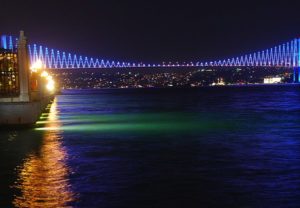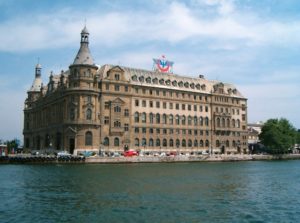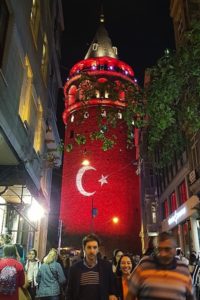Burhan Sönmez: Variations on a life
by Mark Reynolds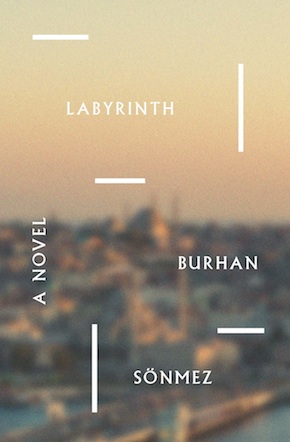
“He uses anecdotes, fables and histories to describe lessons that are valuable for comprehending life. These tales offer morals by which people should live.” The Literary Review
“They call me Boratin, and they show me my ID card so I’ll believe it. They think my parents’ names on the ID card, my date and place of birth are all I need to know who I am. But I don’t want to know who I am, I want to know what I am. They don’t tell me that. What am I?”
Burhan Sonmez’ latest novel Labyrinth is the story of a 28-year-old blues musician who has attempted suicide by jumping off Istanbul’s Bosphorus Bridge. Boratin wakes up in hospital with no memory, and no clue as to why he could have wished to end his life. What follows is a lyrical, probing meditation on history and the present, individuality and society, and the relationship between mind and body. It is intricately interwoven with fables, momentous events, fragmentary memories and discordant beats, as friends and band members, shopkeepers and strangers, neighbours and a sister on the end of a distant phone help him piece together his own identity and his place in the world.
MR: The book poses the question: “Which is more liberating for a man, or a society: knowing the past or forgetting it?” How would you answer this, particularly in regard to contemporary Turkey?
BS: This is a question to individuals and to the whole of society nowadays. Some politicians ask us to forget some parts of history, while some want us to forget other parts. By shaping the history they are trying to shape our future. Memory is not free, it is under the influence of certain powers: politics, media, fashion, etc. What can we do? My protagonist has a different answer from me.
Boratin has also lost his sense of time. He can recall key city landmarks and big events like the fall of the Ottoman Empire, and recognises the story of the death of Christ in his landlady’s pietà figurine, but has no notion of whether those events occurred a few days or thousands of years ago. Was your intention for readers to reflect that such stories remain current for as long as they are shared by generation after generation, as well as to question how much society is – or should be – shaped by official versions of history and identity?
A hundred years after Nietzsche’s death we should do something he aspired to: a unification of mind and body. My novel dives into that part of existence.”
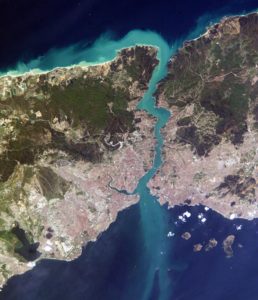
Istanbul, the Bosphorus and the Black Sea – the crossroads of Europe and Asia. NASA Earth Observatory / Wikimedia Commons
I wanted to show difference between the past and history. They are not the same thing. History is dead while the past is alive. If we think of the story of Jesus as something that happened two millennia ago, that is history. If we think and feel that pain of a man on the cross and the sorrow of a mother as if it is happening still in this current world, then it is still alive.
Because Boratin no longer knows his own face or those of his friends, you also raise doubts about the extent to which physicality and physical recognition define us…
The new temple of man is the body in this new age. Gastronomy, plastic surgery, the fashion world, fitness clubs, medicine all contribute to the body becoming the centre of existence. When Descartes claimed that the mind/brain was the centre of our existence, he never imagined that the era of logic would end up putting the body on a pedestal that everyone worships. We wake up every morning to change our appearance in front of the mirror. We try to turn our look into something designed by Hollywood movies and fashion companies. It is freedom, they say, you can do anything, no one is forcing you. But they do not say that our knowledge is bombarded by outside influences. I do not mean to say that the answer to this is to defend only the power of the brain. A hundred years after Nietzsche’s death we should do something he aspired to: a unification of mind and body. The image of Jesus is symbolically important here. He, by his life and thought, praised the spiritual part of us. While doing this his body, his suffering, the man on the cross, has become the centre of the story. My novel, my story dives into that part of existence: the body and the mind/spirit.
All my novels are written in a similar way: stories within stories, interwoven places and times. It is maybe because our sense of storytelling in Turkey and the East is similar to that of Latin Americans like Borges.”
Boratin’s apartment, the city streets and his personal relationships are all labyrinths he must negotiate and decode in an attempt to reconnect with and recover his past. To what extent did you draw on Borges’ Labyrinths in making this novel of interwoven locations, stories and reflections?
You know, the labyrinth is a multifaceted symbol in Borges’ literature. He did not write any book by this title, but the publisher of his books in English made a good choice in calling his selected works Labyrinths. All my novels are written in a similar way: stories within stories, interwoven places and times. It is maybe because our sense of storytelling in Turkey and the East is similar to that of Latin Americans like Borges. I personally admire his literature and always had a wish to write a novel for him. That is why I kind of dedicated this novel to him.
In the apartment Boratin is both anchored and displaced, living among his Greek landlady’s antique furnishings and possessions, alongside more recent relics of his music career, with timeless views over Galata Tower and the lighthouse. What lay behind the choice of that apartment and location?
It shows the multicultural side of Istanbul, that we have been losing. History for societies and for individuals is important and it should not be left to those who will destroy or misuse it. Istanbul, its past, its colourful life and its polyphonic culture should be defended and reproduced every day in life and in literature. The novel is one of the best forms to defend our lives and the positive environment we live in.
Boratin was by all accounts a successful, wealthy, gifted, creatively fulfilled and popular man, and we never get to understand what could have motivated him to jump off the bridge – except that the act and its timing finds and echo in the real-life suicide of Yavuz Çetin soon before the release of his breakthrough album. Was it always your intention to leave the suicide attempt unresolved?
Yes, it was my intention. Because we live in an age where people end their lives for different reasons. Not one particular reason, but the environment we live in that produces suicide should be the focus. I had this story in my notes for many years, but I became sure of its spirit five years ago when I was on the jury of a literary award in Turkey. There were about sixty novels to judge. I read all of them, took notes for each and then realised that about half the books contained suicide or self-harming. That could not be coincidence. Then I understood that my story should not have a resolved end; instead it should describe a labyrinth of life that could take us anywhere depending on our choices and preferences.
Haydarpaşa station is the beginning of Anatolia, the other part of Turkey, and the gateway to the Asian continent. It is symbolically the opening to other worlds and other lives.”
Bessie Smith, Kurt Cobain and Yavuz Çetin – who each died young, Cobain and Çetin both by suicide – all crop up in Boratin’s memory and record collection. What music did you keep returning to while writing this book?
Blues and jazz were always accompanying my words while I was writing the story of Boratin. Singers like Howlin’ Wolf, Muddy Waters and Aretha Franklin were with me.
Istanbul is a city where ancient and modern, East and West, the religious and the secular, rub up against each other. What is it about the city that became vital to this story? And why did you choose to situate the final scene in a pending rainstorm at the majestic but abandoned Haydarpaşa railway station?
Istanbul is the cultural and societal capital of Turkey, it also mirrors the rest of the world with its ancient and modern, East and West. Haydarpaşa station is the beginning of Anatolia, the other part of Turkey, and the gateway to the Asian continent. It is symbolically the opening to other worlds and other lives. Haydarpaşa station was closed down nine years ago, following a suspicious fire on its rooftop. The rain is maybe the hope for the protagonist.
What is the likely future for Haydarpaşa station?
The government, in the beginning, promised to reopen the station, though they missed their stated deadline several times. Later it was revealed that the government wanted to turn it into a fancy hotel or a shopping mall. They love to transform anything beautiful into kitsch money. The government recently agreed to sell the station to an Islamist foundation. NGOs, civic groups and the local city borough are now resisting this move.
What can you tell us about Boratin’s home town of Nehirce? I tried googling it and found nothing. Does it exist, or does the name signify something I didn’t get?
It does not exist. Because in my previous books readers and critics always tried to find autobiographical elements, I wanted to give them as little material as possible this time. But they are more talented than my imagination. They find what they want to.
Erdoğan has always won elections because he managed something the previous governments had not: he united all right-wing parties/votes around himself and divided the opposition into different fragments.”
When we last spoke in 2016, you suggested President Erdoğan was unlikely to serve another term in office, but he has since won a snap election and increased his powers by changing the country’s parliamentary democracy to a presidential system. On the flipside, his party comprehensively lost the mayoral elections in Istanbul (twice) and Ankara, and his power base is diminished in all the main urban areas. How has the mood of the people changed since the election turnaround? Is protest dealt with any more leniently than in recent years? And what lies ahead for democracy and pluralism in Turkey?
Politics is a dirty war in countries like Turkey – nowadays we can say the whole world is shaping up in the same way. Erdoğan declared a war on Kurds and secular parts of society that make up about fifty per cent of the public. Erdoğan has always won elections because he managed something the previous governments had not: he united all right-wing parties/votes around himself and divided the opposition into different fragments. We have lately been hoping for this political map to change. It came a bit late and finally this year Erdoğan has been defeated in local elections because the opposition parties managed to unite around the same candidates for the first time, and as a result Erdoğan lost all the major cities. Erdoğan is now trying to divide the opposition again by playing the nationalist card – because the religious card has done its work but is not enough now. That was one of the reasons Erdoğan sent the Turkish military into Northern Syria to fight the Kurds as soon as the US troops withdrew. That move has fuelled nationalist feelings in Turkish society and Erdoğan expects to rise as a national hero. As soon as he is sure about this he will call for another snap election. We will see how the future takes shape. But the good thing in Turkey is that despite all the power Erdoğan has gathered in two decades, people did not give up resisting his policies. He always says, “I have the support of fifty per cent.” But he does not see that means he has had a strong fifty per cent against him for years.
What are the prospects for and what stands in the way of the creation of an independent Kurdish nation carved out of bits of Turkey, Iraq and Syria? Is it something you would support?
The semi-autonomous Kurdish region of northern Iraq had a referendum last year. It was stopped not by the Iraqi government but by Turkey, the USA, the UK and other international powers. Kurds are the orphaned nation of today in the Middle East. No one defends them. Realistically not any Kurdish power in Turkey, Syria or Iraq has demanded full independence. They are left only one choice: to collaborate with the government of the dominant nation. Independence may not always be the solution, but when we look at all the powers trying to block this option, then I ask why should Kurds not have their own say for their future? We have that right. At least in some part of the Middle East there should have been a free Kurdistan.
Turkey has been knocking on the door of EU membership for twenty years, but negotiations have stalled mainly over human rights violations. Can you envisage a time in the near future when Turkey will be welcomed into the European fold?
There is no future in that path currently. Neither Turkey nor the EU desire it. Each of them is concentrating on their own problems rather than improving relations towards a happy ending.
What have you been writing since completing Labyrinth, and when can we expect the next English translation of your work?
I have been working on a couple of books for a while, but please allow me to keep them to myself. Sometimes talking about a future book may break the spell of writing. That is how I feel at the moment.
A writer of passion, memory and heart, Sönmez revives not only the stories of a land but also its bruised conscience.” Elif Shafak
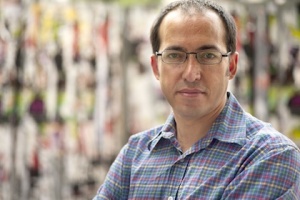 Burhan Sönmez is the author of four novels, which have been translated into forty languages, and translated William Blake’s The Marriage of Heaven and Hell into Turkish. He was born in Central Anatolia and grew up speaking Turkish and Kurdish. He worked as a lawyer in Istanbul before moving to Britain as a political exile, and has lectured in Literature at the Middle East Technical University in Ankara. His writing has appeared in newspapers including the Guardian, Der Spiegel, Die Zeit, and La Repubblica. He received the Vaclav Havel Library Award in 2017, and the EBRD Literature Prize in 2018. A board member of PEN International, he divides his time between Istanbul and Cambridge.
Burhan Sönmez is the author of four novels, which have been translated into forty languages, and translated William Blake’s The Marriage of Heaven and Hell into Turkish. He was born in Central Anatolia and grew up speaking Turkish and Kurdish. He worked as a lawyer in Istanbul before moving to Britain as a political exile, and has lectured in Literature at the Middle East Technical University in Ankara. His writing has appeared in newspapers including the Guardian, Der Spiegel, Die Zeit, and La Repubblica. He received the Vaclav Havel Library Award in 2017, and the EBRD Literature Prize in 2018. A board member of PEN International, he divides his time between Istanbul and Cambridge.
His earlier novels translated into English are Sins and Innocents (Garnet, 2013) and Istanbul Istanbul (OR Books/Telegram, 2016). Labyrinth, translated by Ümit Hussein, is published by Other Press.
Read more
burhansonmez.com
brhnsonmez
@otherpress
Author portrait © Kaan Saganak
Ümit Hussein is of Turkish Cypriot origin and was born and raised in London, where she grew up speaking both Turkish and English. She holds an MA in Literary Translation from the University of East Anglia and has translated work by Ahmet Altan, Yavuz Ekinci, Sine Ergün and Nermin Yıldırım, among others. She lived and worked in Japan, Portugal, and France before settling in Seville, where she is now based.
Mark Reynolds is a freelance editor and writer, and a founding editor of Bookanista.
@bookanista
wearebookanista

